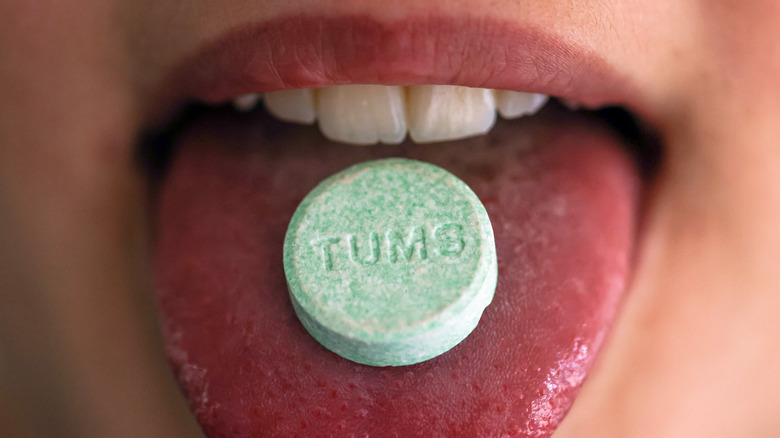You Should Stop Taking Tums If This Happens To You
At some point, we've all eaten something that didn't quite agree with us. Enter Tums — a popular medication used by many as a source of relief from the discomfort of heartburn, upset stomach, or acid reflux (via Tums). Tums is an antacid, which works by neutralizing our stomach acid to ease indigestion symptoms (via the National Health Service). While there are many types of antacids that come in various forms, some ingredients include aluminum hydroxide, magnesium carbonate, and sodium bicarbonate, amongst others. When it comes to Tums, specifically, calcium carbonate is the main ingredient.
So what causes indigestion in the first place? Indigestion, or dyspepsia, can occur as a result of a number of things such as eating spicy foods, eating late in the day, or consuming large amounts of caffeine (via FamilyDoctor.org). Symptoms of indigestion may include gas, burping, bloating, pain, burning, or nausea.
It's comforting to know that Tums can come to our rescue, but just like any other medication, taking too much poses some health risks.
The health hazards of Tums
While Tums can provide much-needed relief, they can interfere with our body's natural digestion process when taken in excess, which is essential for vitamin and mineral intake (via Healing Duo). With antacids working against vitamin absorption, this leaves us susceptible to deficiencies that can negatively impact our health and result in constipation, fatigue, and a decrease in muscle strength. In more severe instances, we leave ourselves vulnerable to infection from pathogens and germs that would otherwise be fought off by those acids.
On the flip side, taking too many Tums simultaneously puts us at risk for receiving too much of certain minerals. According to Healing Duo, the active ingredient in Tums — calcium — can build up in the body if consumed in excess and increase the likelihood of kidney or heart issues. Too much calcium in the body may result in headaches, increased urination, an abnormal or quickened heart rate, and high blood pressure. Take note if you experience any of these symptoms and stop the use of the medication.
Experts suggest stopping Tums after 2 weeks. If symptoms have not improved, contact your physician (via Tums). Additionally, Tums' manufacturer cautions against exceeding the suggested daily amount. Be mindful of the dosages outlined on the product, especially if you are pregnant.


